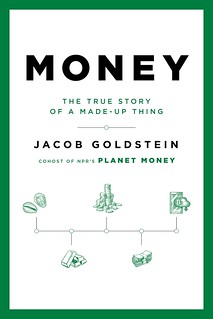
PREV ARTICLE
NEXT ARTICLE
FULL ISSUE
PREV FULL ISSUE
NEW BOOK: MONEYThe New York Times reviewed a new book on the nature of money by Jacob Goldstein. -Editor
Of all the inventions we rely on to get through the day, nothing is as strange as money. Currency is a national bedrock that sits alongside anthems and flags; our cash — from pristine $100 bills to dog-eared 5 pound notes — seems solid, official and enduring. At the same time money is a confidence trick: an i.o.u. printed on cheap material that promises the holder nothing but more paper money. The evolving paradox of modern currency — foundational yet resting on faith — is the central theme of "Money," a sweeping new history by Jacob Goldstein. A health reporter during the mid-aughts, Goldstein describes being drawn toward money and economics by the beguiling turbulence of the 2008 crisis. Now a host of NPR’s "Planet Money," he features that show’s trademark storytelling throughout his new book. Histories of money need lots of facts and dates; as a result many are turgid. "Money" is fast-paced and chatty: We meet all the characters an academic book would include, their ideas and innovations blended with scandal and gossip to propel the story along. The effect is a history of currency full of astonishing tales you might tell a friend in the pub. The main thread is set out right away: Money "seems cold and mathematical and outside the realm of fuzzy human relationships," Goldstein asserts. But it’s really "a made-up thing, a shared fiction. Money is fundamentally, unalterably social." The early chronicles of cash show how societies move from monies with intrinsic value (commodity currencies, like salt, or coins made from precious metal) to paper currencies that are valuable because they are tools — ways to exchange goods and services. The case of Kublai Khan, the leader of the Mongol empire in the late 1200s, is an early example of this innovation. His first paper money, the "treasure exchange voucher," guaranteed the holder bronze coins. Then the Khan took a magical and modern step, stripping the link with bronze so that his money was "almost pure abstraction, backed by nothing." The success of this currency and those that followed is essentially social: They circulate when everyone in an economy agrees they will. There is much ground to cover as "Money" moves from traders in Sichuan to goldsmiths in London to investors in the Mississippi Territory. Each treatment is necessarily brief, and some readers may want more detail. But stacking up case studies like this means a bigger story — a recurring pattern — begins to appear. Cash evolves in fits and starts; there are long periods of stability where nothing much happens followed by rapid bursts of change. The Federal Reserve is a case in point: The world’s most important bank exists because of a financial panic in 1907 and decisions taken by a small group of bankers immediately after it. These bursts of innovation happen when the wants, needs and trades in an economy shift. Money changes when society does. Looking to the future, Goldstein unpicks the origins of bitcoin, a new digital currency that many are betting is the money of tomorrow. Yet he argues that new forms of cash often emerge by accident from unexpected places, rather than by design, as is the case with cryptocurrencies. For this reason, I would have liked a chapter on underground and informal currencies. People living in the world’s toughest economies use all sorts of monies that are "made up." From powdered milk in Syrian refugee camps to prepaid debit cards in United States prisons to pawnshop tickets in postindustrial British cities, a world of hidden currency innovation by economic outsiders exists. These shadow monies too are social, unofficial and come to the fore where the mainstream system fails.
To read the complete article, see:
THE BOOK BAZARREWayne Homren, Editor The Numismatic Bibliomania Society is a non-profit organization promoting numismatic literature. See our web site at coinbooks.org. To submit items for publication in The E-Sylum, write to the Editor at this address: whomren@gmail.com To subscribe go to: https://my.binhost.com/lists/listinfo/esylum All Rights Reserved. NBS Home Page Contact the NBS webmaster 
|
